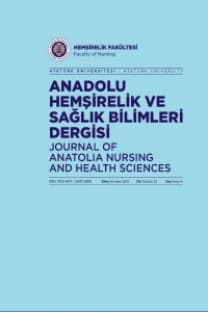YENGDOĞANDA YARARSIZ BAKIM*
Futile Care in Newborn
___
- Aghabari M, Nayeri ND. Futile Care: Challenges of Appling Futility Concept in Caring Domain. Hayat of Journal 2015;21(1):1-5.
- Aslıhan A, Ersoy N. Yaşamı Destekleyen Tedaviler: Ne Zaman Esirgenmeli? Ne Zaman Sonlandırılmalı?. Türk Onkoloji Dergisi 2012;27(1):37-45.
- Akpir K. Yoğun Bakım Etiği. Türk Yoğun Bakım Derneği Dergisi DOI: 10.4274/tybdd.08.06
- Commitee on Ethics, American College of Obstetricians and Gynecologist. ACOG Commitee Opinion No. 362: Medical Futility. Obstet Gynecol 2007;109(3):791-4.
- Avery GB. Futility Considerations in the Neonatal Intensive Care Unit. Semin Perinatol 1998;22(3):216- 22.
- Akpınar A, genses MO, Aydın Er R. Attitudes to end-of-life Decisions in Pediatric Intensive Care. Nursing Ethics 2009;16(1):83-92.
- Biley FC. Nursing Redefined: Emergent Insights from Studying The Art And Science of Nursing in Germany and Switzerland. Journal of Nursing Theory 2005;14(2):23-6.
- Chwang E. Futility Clarified. Journal of Law, Medicine & Ethics 2009;37(3)487-95.
- Coppa S. Futile Care: Confronting the High Costs of Dying. J Nurs Adm 1996;26(12):18-23.
- Cogliano JF. The Medical Futility Controversy: Bioethical Implications for the Critical Care Nurse. Crit Care Nurs Q 1999;22(3):81-8.
- The Ethics Committee of The Society of Critical Care Medicine. Consensus Statement of the Society of Critical Care Medicine's Ethics Committee Regarding Futile and Other Possibly Inadvisable Treatments. Crit Care Med 1997;25(5):887-91.
- Darr K. In The Matter Of Baby K: Implication for Hospital Administration. Hospital Topics 1995;73(1): 4-6.
- Dinç L. Bakım Kavramı ve Ahlaki Boyutu. Hacettepe Sağlık Bilimleri Fakültesi Hemşirelik Dergisi 2010;74-82.
- Duff RS, Campel AGM. Moral and Ethical Dilemmas in the Special-Care Nursery. N Engl J Med. 1973;289(17):890-4.
- Gabbay E, Calvo-Broce J, Meyer KB, Trikalinos TA, Cohen J, Kent DM. The Empirical Basis for Determinations of Medical Futility. Gen Intern Med 2010;25(10):1083-9.
- Gerald W, Neuberg MD. The Cost of end-of-life Care: A New Efficiency Measure Falls Short of AHA/ACC Standards. Circulation: Cardiovascular Quality and Outcomes 2009;2(2):127-33.
- Kasman DL. When is Medical Treatment Futile? A Guide for Students, Residents and Physicians. JGIM 2004;19(10):1053-6.
- Khatcheressian J, Beth Harrington S, Lyckholm, LJ, Smith, TJ. Futile Care: What to do When Your Patient Insists on Chemotherapy That Likely Won"t Help. Oncology Journal 2008;22(8):881-8.
- Medical Futility. Ethics, Commitee Opinion. The American College of Obstetricians and Gynecologist. 2015;362.
- Misak CJ, White DB, Truog RD. Medically Inappropriate or Futile Treatment: Deliberation and Justification. J Med Philos 2016;41(1):90-114.
- Meltzer LS, Huckabay LM. Critical Care Nurses' Perceptions of Futile Care and Its Efect on Burnout. Am J Crit Care 2004;13(3):202-8.
- Mobley MJ, Rady MY, Verheijde JL, Patel B,Larson JS. The Relationship Between Moral Distres and Perception of Futility in The Critical Care Unit. Intensive and Critical Care Nursing 2007;23(5):256-63.
- Nurok M, Sadovnikoff N. Why are We Doing This Case? Can Perioperative Futile Care Be Defined? Current Opinion in Anaesthesiology 2013;26(2):176- 81.
- Paris JJ, Goldsmith JP, Cimperman M. Resuscitation of a Micropreemie: The Case of Macdonald V. Milleville. J. Perinatol 1998;18(4):302- 5.
- Peter A, Clark SJ. Medicine and Society Medical Futility: Legal and Ethical Analysis. American Medical Association Journal of Ethics 2007;9(5):375- 83.
- Potter PA, Perry AG, Stockert PA, Hall AM. Caring in Nursing Practice. Fundamentals of Nursing. 8nd ed. Missouri : Elseiver; 2013. p.79-110.
- Duff RS, Campbell AGM. Moral and Ethical Dilemmas in the Special-Care Nursery DOI:10.1007/978-94-011-6621-8_57
- Romesberg TL. Futile Care & Neonate. Advances in Neonatal Care 2003;3(5):213-9.
- Sayek F. Füsun Sayek TTB Raporları/ Kitapları Sağlıkla İlgili Uluslararası Belgeler. Venedik Bildirgesi Ölümle Sonuçlanacak Hastalık; 2009:33.
- Sibbald R, Downar J, Hawryluck L. Perceptions of Futile Care Among Caregivers In Intensive Care Units. Canadian Medical Association 2007;177(10): 1201-8.
- Saettele A, Kras J. Current Attitudes of Anesthesiologists Towards Medically Futile Care. Open Journal of Anesthesiology 2013;3(4):207-13.
- TDK Büyük Türkçe Sözlük. Türk Dil Kurumu Yayınları, 2011.
- Tyson J. Evidence-Based Ethics and the Care of Premature Infants. Future Child 1995;5(1):197-213.
- Türk Tabibler Birliği Etik Bildirgeler ÇalıGtayı Sonuç Raporu. Türk Tabibler Birliği. 2008. p.32-3.
- Yekefallah L, Ashktorab T, Manoochehri H, Hamid AM. Nurses" Experiences of Futile Care at Intensive Care Units: A Phenomenological Study. Global Journal of Health Science 2015;7(4):235-42.
- ISSN: 1309-5471
- Yayın Aralığı: 4
- Yayıncı: Atatürk Üniversitesi Hemşirelik Fakültesi
HEMŞİRELERİN HEMŞİRELİK SÜRECİ UYGULAMASINDA YAŞADIKLARI GÜÇLÜKLERİN İNCELENMESİ
Handan ÖZDEMİR, Ayten ZAYBAK, Elif GÜNAY İSLAMOĞLU
FLÖRT ŞİDDETİ TUTUM ÖLÇEĞİ GEÇERLİLİK VE GÜVENİRLİLİK ÇALIŞMASI
ANNELERİN DOĞUM SONU GÜVENLİK HİSLERİ ÖLÇEĞİ
Emine GEÇKİL, Vesile KOÇAK, Kamile ALTUNTUĞ, Emel EGE
FLÖRT ŞİDDETİ TUTUM ÖLÇEĞİ GEÇERLİK VE GÜVENİRLİK ÇALIŞMASI
İlknur Münevver GÖNENÇ, Füsun TERZİOĞLU, Funda ÖZDEMİR, Gülten GÜVENÇ, Gülşah KÖK, Neslihan YILMAZ SEZER, Başak DEMİRTAŞ HİÇYILMAZ
YAŞLI BİREYLERDE KURU GÖZ SEMPTOMU YAYGINLIĞI VE İLİŞKİLİ FAKTÖRLER
MENOPOZAL DÖNEMDE YAŞANAN VAZOMOTOR YAKINMALARIN
Ebru GÖZÜYEŞİL, Mürüvvet BAŞER
OLAĞANÜSTÜ DURUMLAR VE HEMŞİRELİK
ANNELERİN DOĞUM SONU GÜVENLİK HİSLERİ ÖLÇEĞİ:GEÇERLİK ve GÜVENİRLİK ÇALIŞMASI
Vesile KOÇAK, Emine GEÇKİL, Kamile ALTUNTUĞ*, Emel EGE
Serap ÖZTÜRK ALTINAYAK, Elif Yağmur ÖZORHAN, Serap EJDER APAY
